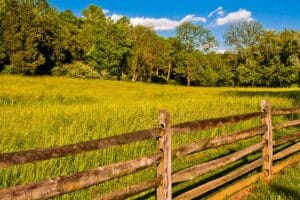When someone decides to buy a rural property, frequently the first inclination is to get out and “go shopping”. Viewing properties is usually fun, especially when they are located in the country and the sun is shining. But making that your very first step could lead to disappointment along the way. Unfortunately, I often meet folks that have only a vague idea of the steps involved in the real estate shopping process and as a result quickly get frustrated with the endeavor. To avoid such frustration, there are four distinct steps that buyers should consider to prepare for serious shopping.
1. Choose Your Price Range
Step one is so important yet many buyers procrastinate because it’s just not fun to get pre-approved for a mortgage. Yes, it’s certainly more exciting to look at properties and dream than to have your mortgage banker or accountant tell you the cold hard facts, but skipping this essential step will only lead to disappointment later. There are few things as disheartening as having your heart set on a property only to find that you just can’t swing it financially. Knowing what you can afford will help you shop with confidence. You’ll also save time by only concentrating on the properties that are within your budget.
2. Choose Your Area
This second step will require you to spend some time online and in your car researching the area where you want your property to be. Too often people short cut this step and as a result they spend days looking at properties in a certain location only to find that they like a different area better. One example is the Driftless area of Southwest Wisconsin. I frequently meet people that are completely unaware of the rugged beauty and reasonable prices just a few hours from their front door. A little time spent exploring different areas would have revealed this hidden jewel to them before they spent days looking elsewhere.
Some things to consider when doing your research are:
A) How far are you willing to drive from your principal residence? A property is of little good to you if you don’t use it.
B) What are your preferred recreational activities? Is there opportunity to enjoy the activities in the area?
C) Will your friends or family be willing to join you there? Too often I see buyers hoping to use a property to reconnect a family only to find that the family members seldom make the trip.
D) Do you like the communities in the area? Second homes often turn into primary residences at retirement so will you enjoy spending more time there?
A little time spent researching various location options will help you feel confident that there isn’t something better for you just over the horizon.
3. Choose Your Agent
Once you have an area selected for your recreational property or second home, it’s time to choose an agent to work with. While some people just call the agent that is on each for sale sign, most buyers find that working with a single agent is to their advantage. When you work with several agents, each one may pressure you to buy their listing instead of considering the best property for you.
When a buyer is committed to working with a single agent, it allows that agent to focus on the buyer’s needs and provide service without the pressure to buy any certain property. Most agents have access to the listing info for all of the available properties in the area so your agent can work with you on virtually any property you are interested in. Enlisting your agent in writing as your buyer’s agent allows him/her to represent you (not the seller) in the transaction and allows them more freedom when advising you.
Choose an agent that can provide the proper tools (i.e. GPS, mapping, ATV) to help you get a really good feel for each property you view. You’ll also want an agent that is experienced in rural property transactions. You wouldn’t expect a medical malpractice attorney to be as familiar with divorce proceedings as a family law attorney. Similarly, an agent that specializes in urban properties won’t be as familiar with the intricacies of rural properties as an agent that does it on a daily basis. Even as I write this, a fellow agent commented to me in exasperation “Is there ever a transaction that is easy any more?” The fact is that rural real estate has changed a lot in the last few years and “perfect” transactions are a lot less common. Having an experienced agent representing you can mean the difference between obtaining your dream property and a lot of disappointment.
4. Choose Your Priorities for a Property
Once you have an agent that you’re comfortable working with, it’s time to have a good heart-to-heart talk. To help you find the perfect property, your agent will need to know how much you can spend and as many details about your ideal property as you can provide.
A list of priorities is also helpful when you start visiting properties. In some cases you just won’t find everything on your “Perfect Property List”, so decide which features are absolute requirements, and which ones you could live without or add after the purchase. Look into the future especially if you intend to keep the property long term. Will it still work when you retire and could it be modified to meet your needs as you age? Finding the perfect property is often a process and your wants and needs may fluctuate slightly as you shop. Be sure to keep your agent abreast of those changes so the properties he/she suggests are relevant to your current desires.
With these simple preliminaries out of the way, you will be able to enjoy the property buying adventure. Before long your agent will introduce you to a property that you fall in love with and want to pursue. He/she will be there to guide you through the negotiation process, inspections, permits, surveys, title commitment, etc. With the proper preparation, you’ll look back at it and say, “That went well.”
This content may not be used or reproduced in any manner whatsoever, in part or in whole, without written permission of LANDTHINK. Use of this content without permission is a violation of federal copyright law. The articles, posts, comments, opinions and information provided by LANDTHINK are for informational and research purposes only and DOES NOT substitute or coincide with the advice of an attorney, accountant, real estate broker or any other licensed real estate professional. LANDTHINK strongly advises visitors and readers to seek their own professional guidance and advice related to buying, investing in or selling real estate.










Great points but in Point 4, both buyers and sellers should….
Getting an Accredited Land Consultant that has Land brokerage training and personal experience is strongly suggested for any investor or seller of Land. Go to http://www.rliland.com and research who, what, where and why you should have a member involved.
When we go to real estate school all over the country and for years, students are not taught anything about Land brokerage, so just because you have a real estate license, does not give you the necessary tools to direct a most serious investment or liquidation.
In fact, our Realtors® Code of Ethics, Article 11 states:
Article 11
The services which REALTORS® provide to their clients and customers
shall conform to the standards of practice and competence which are
reasonably expected in the specific real estate disciplines in which they
engage; specifically, residential real estate brokerage, real property
management, commercial and industrial real estate brokerage, land
brokerage, real estate appraisal, real estate counseling, real estate
syndication, real estate auction, and international real estate.
REALTORS® shall not undertake to provide specialized professional
services concerning a type of property or service that is outside their
field of competence unless they engage the assistance of one who is
competent on such types of property or service, or unless the facts are
fully disclosed to the client. Any persons engaged to provide such
assistance shall be so identified to the client and their contribution to
the assignment should be set forth. (Amended 1/10)
Also, several states have adopted “Land Disclosure” forms to be filled out by the sellers during the listing process. Our State of North Carolina is currently working on one and have identified over 93+ potential Land issues and observations.
Lou,
You make good points. Just having a real estate license doesn’t make anyone qualified to be a land brokerage expert. Even specializing in land doesn’t guarantee proficiency.
On the other hand, while an ALC designation does indicate a high level of education and experience in land brokerage, I would assert that a broker can certainly have the experience, education and competence to be very proficient land broker without the official ALC designation.
I actually would like to discuss this with you privately. Please email me at jcf@ruralpropertypro.com
I agree with Jay! While Lou Jewell is a very qualified land specialist in our N.C. mountains, and a worthy competitor of ours – as well as an instructor for the ALC certification, he does not give credit to the full meaning intended in the REALTOR® Code of Ethics.
The Code states that:
1) services which REALTORS® provide to their clients and customers shall conform to the standards of practice and competence which are reasonably expected in the specific real estate disciplines in which they engage, and
2) REALTORS® shall not undertake to provide specialized professional services concerning a type of property or service that is outside their field of competence.
The Code does not say they must have their ALC certification to meet or exceed the above levels of competence and service to clients and customers.
Consider the agent with 40+ years of land experience, with $30, $50, or even $100,000,000 in sales under his or her belt. Would that level of land experience out-weight an individual with a certification and only $10,000,000 in land sales experience (as required for ALC certification)?
Having the ALC certification shows commitment to, and knowledge of, land sales – and should certainly be recognized as advantageous for land buyers and sellers. It does not, in my opinion, out-weigh years of in-the-dirt, tried and proven experience however.
As an aside, I applaud Lou Jewel for his dedication, not only to excellence in the land business, but also to teaching others how to achieve that excellence.
Great article, Jay! Maybe this is obvious but I mention it anyway. Make sure you are not landlocked. Be sure you have legal access to the land. You may have to go through other owners to get to your parcel if it is not bordered by a state/ county road. So some sort of deeded easement is a must, even if there is not already a road to the property you need permission to build one. Thanks, again, for the fine article.
Kurt
Thanks for the comment Kurt. There are many things such as legal access that could relate to a property and unfortunately I didn’t have the space to discuss them in this article. At some point maybe I or someone else can do article on them. The potential pitfalls are all the more reason to have an experienced buyer’s agent. Again, thanks for the comment and “stay tuned”.
I’m looking for an expert witness in the Real Estate profession for the state of Kentucky. If anyone knows someone who is qualified to testify on matters such as ethics regarding Kentucky realtors please contact me at sg900rr@aol.com. thank you
Jay,
I have a related but somewhat different situation. We’ve actually gone through the 4 steps you mention and feel vindicated / encouraged that we’re on the right track.
However, I’m looking for (UNBIASED) information on purchasing harvested land from a logging company. the deal seems too good to be true pricewise, terms, etc. The land is perfect, within reasonable drive from home but a bit far for daily commute, we’d use it for weekend getaway cabin-in-the-woods. Generally speaking can you or any of your readers comment on the pitfalls of such deals?